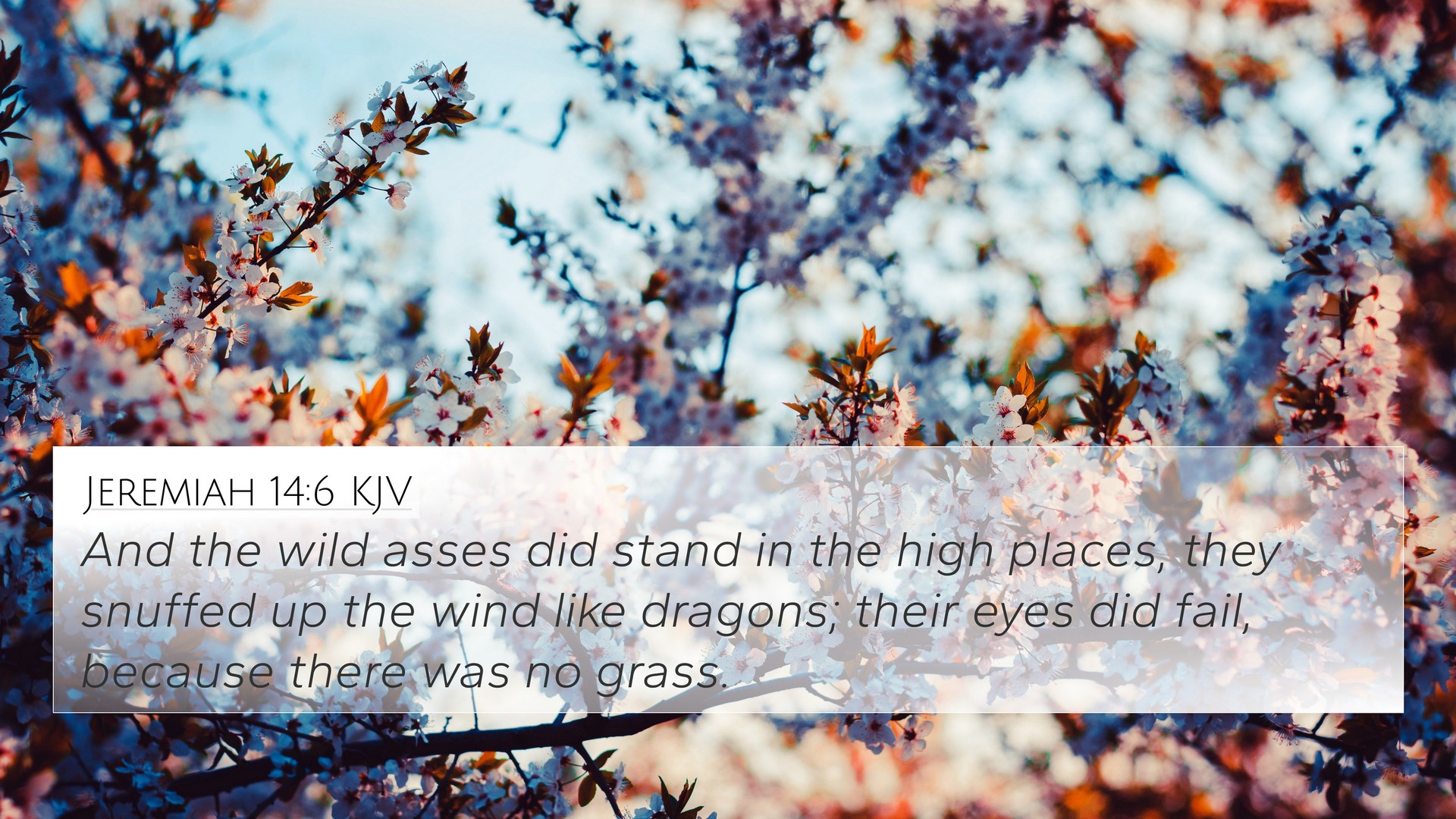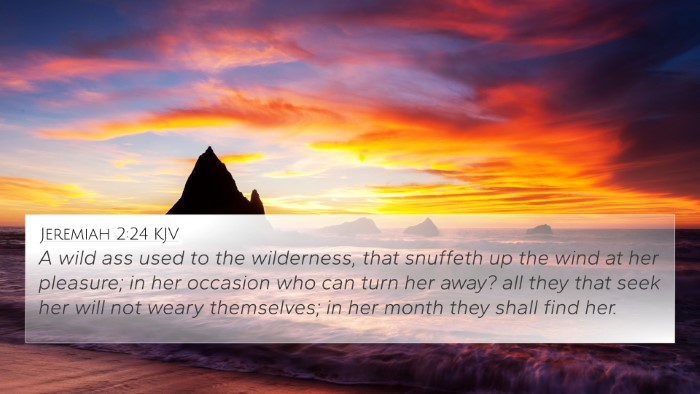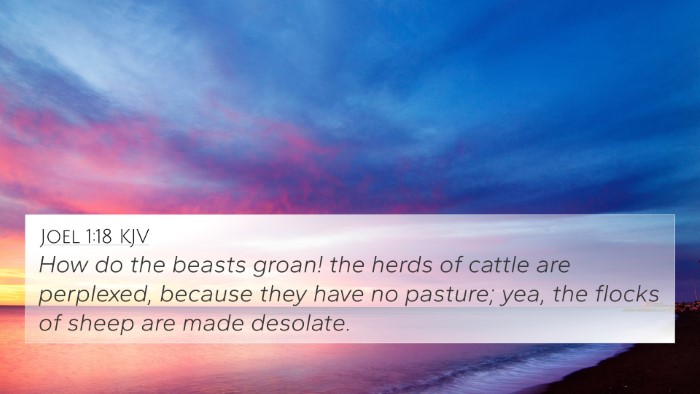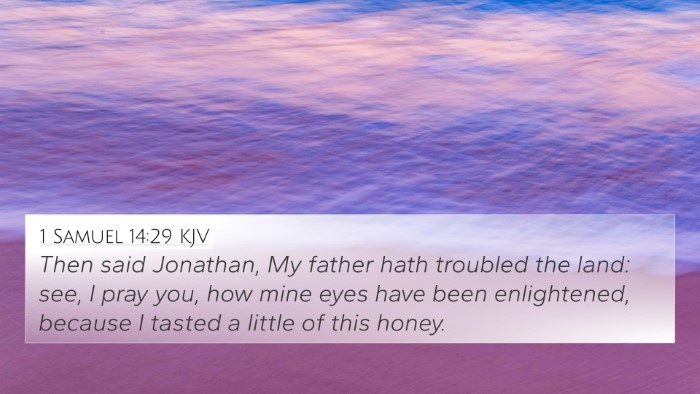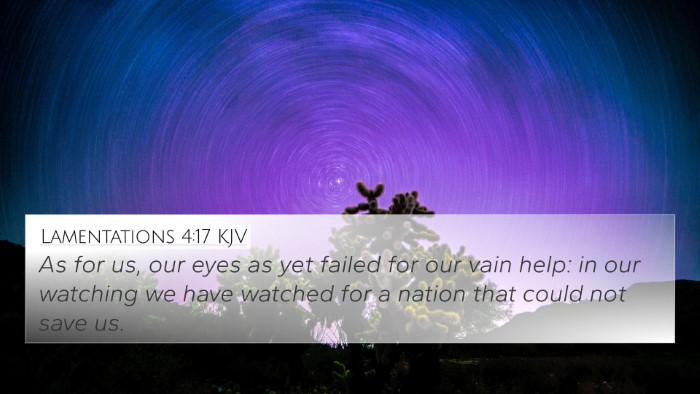Understanding Jeremiah 14:6
Jeremiah 14:6 states: "And the wild asses did stand in the high places; they snuffed up the wind like dragons; their eyes did fail because there was no grass." This verse presents a vivid image of desolation and longing, reflecting the spiritual and physical drought faced by Judah during the time of Jeremiah's prophecy.
Meaning and Interpretation
The imagery of the wild asses, or donkeys, standing in high places illustrates the desperate situation faced by not only humanity but creation itself. The beasts, typically indicative of desolation, represent the state of the people who lack sustenance.
- Symbolism of the Wild Asses: These creatures symbolize a longing for nourishment and symbolize the state of the Jewish people under siege and spiritual famine.
- High Places: "High places" may indicate elevated areas of vulnerability or the elevation of one’s desires amidst suffering, showing how even in desperation, the people seem to look for sustenance from lofty sources rather than acknowledging their spiritual shortcomings.
- The Sniffing of the Wind: This action suggests searching or yearning for something that is absent; it reflects the people’s urgent need for revival and sustenance that they fail to grasp.
Contextual Analysis
Jeremiah is known as the weeping prophet, and this chapter underscores the dire consequences of disobedience to God. The lack of physical sustenance mirrors the spiritual plight of Israel. Together, this underscores the need for repentance and a return to God’s ways.
Bible Verse Cross-References
This verse links to several other scriptures, which collectively enhance the understanding of the themes presented in Jeremiah 14:6:
- Isaiah 1:3: Illustrates the ignorance of the people, paralleling the theme of animals understanding their need for sustenance.
- Jeremiah 8:7: Animal behavior is highlighted as a contrast to the people's stubborn refusal to return to God.
- Proverbs 30:30: The lion as a strong creature reflects the absences of strength in Judah, like the neglect seen in the wild asses.
- Psalms 36:6: The dependence of all creatures on God’s provision aligns with the themes of scarcity and need in Jeremiah.
- Ezekiel 34:5: Describes the state of the people as scattered without a shepherd, echoing the desolation expressed in Jeremiah.
- Matthew 25:35: Reflects the spiritual implications of hunger and thirst as they pertain to the human condition.
- John 6:35: Jesus claims to be the Bread of Life, parallel to the longing for physical and spiritual sustenance.
Thematic Connections
Jeremiah 14:6 fits within a broader narrative of longing for divine intervention and redemption. This longing can be observed throughout scripture, particularly in other texts that emphasize suffering and the subsequent relief found in God.
- Spiritual Drought: Like the physical drought in Jeremiah, other verses illustrate the absence of God’s presence leading to spiritual desolation.
- Wild Animals as Metaphors: Throughout scripture, animals are often used symbolically to convey messages regarding human behavior and societal conditions.
- God’s Provision: The theme of God as a provider recurs in various scriptures, emphasizing the necessity of relying on divine sustenance.
Practical Application
This passage encourages believers to reflect on their spiritual nourishment and the sources they pursue for sustenance. It warns against reliance on earthly desires represented by the high places, redirecting focus to the true source of life, which is God Himself.
Conclusion
In conclusion, Jeremiah 14:6 serves as a poignant reminder of the spiritual and physical need for God’s provisions. Cross-referencing this verse with other biblical texts illuminates the interconnectedness of scripture and demonstrates the profound need for divine assistance in our lives.
Helpful Tools for Bible Cross-Referencing
For a deeper study, consider utilizing:
- Tools for Bible cross-referencing
- Bible concordance for tracing themes
- Bible cross-reference guide for detailed studies
- Cross-reference Bible study for enhanced understanding
- How to use Bible cross-references effectively in study and application
- Bible reference resources for accessing additional scripture
- Comprehensive Bible cross-reference materials for preaching
Further Study Suggestions
To further engage with the themes present in Jeremiah 14:6, consider exploring:
- How to find cross-references in the Bible related to longing and spiritual emptiness
- Identifying connections between Old and New Testament themes of sustenance
- Detailed cross-references between Gospels that highlight human need and divine provision
- Bible verses related to divine nourishment and sustenance
- Comparative study of thematic elements found across Jeremiah and the Gospels
- Cross-referencing Psalms with New Testament teachings on fulfillment through Christ
Encouragement for Reflection
This verse invites every believer to introspectively consider what nourishes their spirit and how they can align their lives more closely with God’s wishes. Through prayer and study, we can draw nearer to understanding our own needs and the profound truth that God is the ultimate sustainer.
